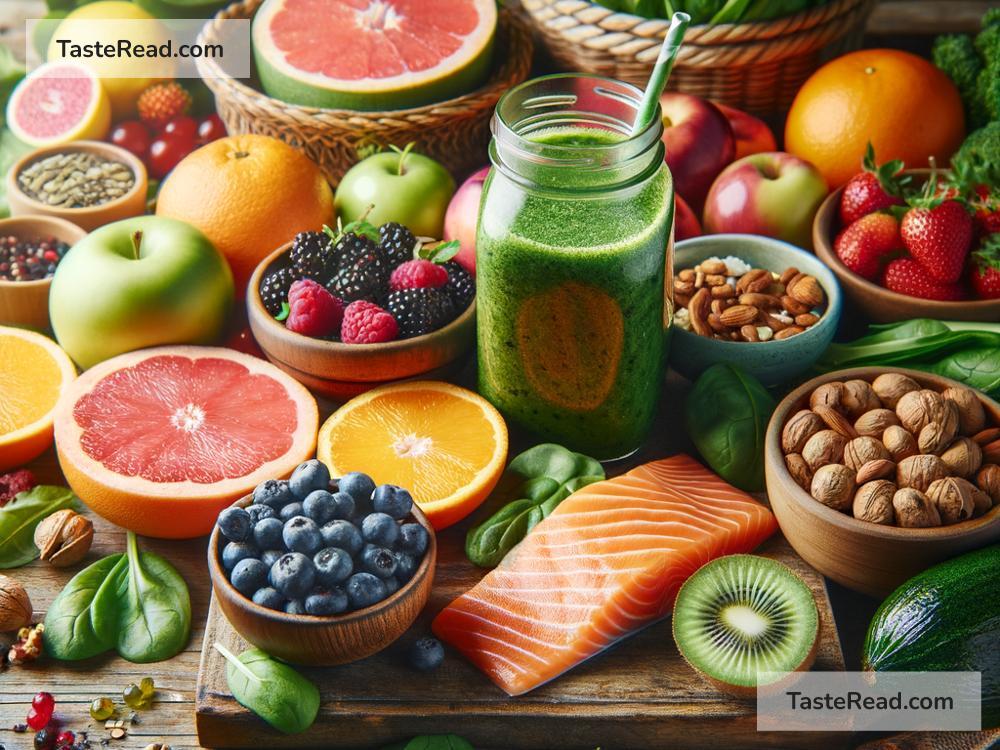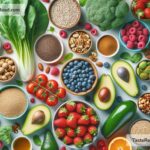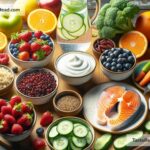Foods for Improving Well-Being
When you’re feeling sluggish, stressed, or low on energy, it’s tempting to grab junk food for a quick boost. But in the long run, the right foods can help you feel healthier, happier, and more energetic. The food we eat affects not only our physical health but also our mental and emotional well-being. By choosing nutritious options, we can fight illness, reduce stress, and keep our minds sharp. Here are some simple foods you can eat daily to improve your well-being.
1. Fruits and Vegetables: Nature’s Multivitamins
Fruits and vegetables are packed with vitamins, minerals, and antioxidants that protect your body from diseases and keep you energized.
- Leafy Greens: Vegetables like spinach, kale, and broccoli are rich in vitamin K, calcium, and magnesium, which strengthen your bones and muscles. They also contain folate, which helps your brain and combats depression.
- Berries: Blueberries, strawberries, and raspberries are small but mighty. They are full of antioxidants, which prevent damage to your cells and reduce inflammation. Berries can also improve your memory and brain function.
- Citrus Fruits: Oranges, lemons, and grapefruits are high in vitamin C. This vitamin boosts your immune system, helps your skin glow, and reduces stress.
Aim to fill half your plate with colorful fruits and vegetables at every meal.
2. Whole Grains for Sustained Energy
Whole grains like oats, quinoa, brown rice, and whole wheat bread provide your body with fiber, which helps with digestion. Unlike refined grains, which can cause energy crashes, whole grains give you steady energy throughout the day.
- Oats: Starting your day with oatmeal can keep you full and focused for hours. Oats contain complex carbohydrates and antioxidants that support heart health and energy levels.
- Quinoa: Quinoa is a gluten-free grain packed with protein, iron, and magnesium. It’s a great side dish or addition to salads.
Whole grains also help control your blood sugar levels, making them a great choice for people with diabetes or anyone who wants to avoid sugar spikes.
3. Healthy Fats: Fuel for Your Brain
Not all fats are bad for you! Healthy fats found in foods like nuts, seeds, avocados, and fish are essential for brain and heart health.
- Avocados: Avocados are loaded with monounsaturated fats, which improve cholesterol levels and keep your arteries healthy. They also contain potassium, which lowers blood pressure.
- Nuts and Seeds: Almonds, walnuts, and chia seeds are a great source of omega-3 fatty acids, protein, and fiber. Omega-3s are particularly important for reducing stress and improving mood.
- Fatty Fish: Salmon, mackerel, and sardines are rich in omega-3 fatty acids, which support brain function and protect against sadness, anxiety, and memory problems.
Including healthy fats in your diet ensures your body gets the energy and nutrients it needs.
4. Protein for Strength and Focus
Protein is critical for building muscles, repairing tissues, and staying focused during the day. Good sources include lean meats, eggs, beans, and dairy products.
- Eggs: Eggs are a complete protein, meaning they contain all the essential amino acids your body needs. They’re also rich in choline, which supports brain health.
- Beans and Lentils: If you’re vegetarian or looking to cut back on meat, beans and lentils are excellent sources of plant protein. They’re also high in fiber, helping you stay full longer.
- Greek Yogurt: Greek yogurt is a creamy, satisfying snack packed with calcium and probiotics, which are good for digestion and gut health.
Try to have protein in every meal, whether it’s scrambled eggs for breakfast, fish for lunch, or beans for dinner.
5. Hydration: Water is Life
While food is important, water is just as essential for well-being. Drinking enough water boosts your energy, reduces headaches, and promotes healthy digestion. If plain water feels boring, try adding slices of lemon, cucumber, or berries for flavor.
Additionally, herbal teas like chamomile or green tea can have calming and energizing effects. Green tea is loaded with antioxidants, while chamomile can help you relax and sleep better at night.
6. The Magic of Dark Chocolate
Good news for chocolate lovers! Dark chocolate (with 70% cocoa or more) can improve your mood and lower stress. It contains magnesium, which helps relax your muscles and mind. Plus, it’s full of antioxidants that benefit your heart. Just remember to eat it in moderation—one or two squares a day is perfect.
Final Tips: Balance is Key
Eating for well-being doesn’t mean cutting out all your favorite treats. The goal is to find balance. Focus on adding nutrient-rich foods into your daily diet while still enjoying the occasional indulgence. Avoid ultra-processed foods and sugar-filled snacks, as these can drain your energy and make you feel worse.
Remember—small changes can make a big difference over time. Keep healthy snacks like fruit, nuts, or yogurt handy, drink water throughout the day, and choose whole grains over refined ones. Over time, you’ll notice you have more energy, clearer thoughts, and better moods.
So next time you reach for a snack or plan a meal, think of ways to nourish your body and mind with wholesome foods. You deserve to feel your best!
Improving well-being starts with simple choices on your plate. What foods do you enjoy that make you feel great? Let us know in the comments!


